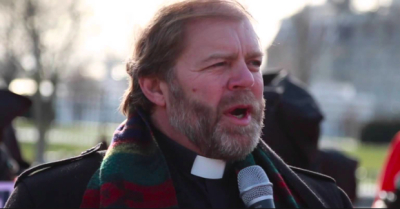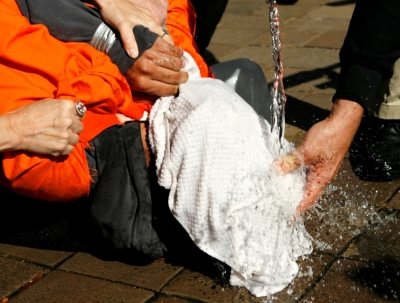Torture Is a Denial of Jesus

One of the most dramatic scenes in the Gospels is when Peter—as he watches Jesus' arrest and imminent torture--denies even knowing who Jesus is out of fear for his own safety.
This is a story that strikes especially close to home following an election where politicians suggested Christians should support the use of torture against American prisoners in hopes that doing so might make us more safe.
As fear of terrorism grew and candidate Trump pledged to round up "bad dudes" around the world and inflict "waterboarding and worse" upon them, some in the media and Washington began to question whether the U.S. could afford to continue along the higher moral path of rejecting torture.

But since the election, Christian voters have joined our military leadership in helping to renew bi-partisan support for the idea that torture is both morally indefensible and strategically ill-advised.
When Congress came back into session after Christmas, thousands of mostly-evangelical voters flooded the phone lines of Senators on the committees holding hearings for the Cabinet members who would have input on U.S. torture policy. And nearly 100,000 signed a petition directed at the incoming head of the CIA, Rep. Mike Pompeo, asking that he reaffirm the CIA's position that it will never again allow our prisoners to be tortured.
We argued that a Christian does not have to adhere to the belief that the Gospels are a handbook for nonviolent action to see that torture is an abhorrent abuse of state power that dehumanizes both the victim and the soldier or intelligence official ordered to carry it out. Our military leaders and intelligence officials are clear that torture doesn't work as a way of generating intelligence they can trust and use. And it puts our own troops at risk.
Finally, Christians in particular should understand best that God never asks us to respond to evil and darkness with more of the same. Jesus' example and teachings that compelled so many Christians to speak out against torture do not come from a place of weakness, but from the greatest strength.
We know we cannot win the battle for hearts and minds against the evil and hateful narrative terrorists espouse by adopting the terrorists' inhuman tactics and debasing centuries of American ideals and moral authority.
It was with that understanding that Senator John McCain, himself a victim of torture when being held as a POW in Vietnam, brought an overwhelming majority of Republicans and Democrats together in 2015 to cement into law the Senate Intelligence Committee's recommendation that the CIA never again engage in torture.
During the debate around that law, National Association of Evangelicals President Leith Anderson sent a letter to all 100 Senators citing the NAE's opposition to torture because it is "a violation of basic human dignity that is incompatible with our beliefs in the sanctity of human life."
It was in that spirit that Christians again brought our witness to Capitol Hill over these past few weeks and delivered a clear message: For Christians, the sanctity of human life and dignity of God's children stem from God's commandments, but also from the recorded and daily witness of Jesus Christ. To deny these truths by supporting the use of torture, for any reason, is to deny Jesus. It's just that simple.
Our message was heard! During their confirmation hearings, nominees Senator Sessions (Attorney General), General Mattis (Defense), General Kelly (Homeland Security), Rex Tillerson (State Department), and Rep. Pompeo (CIA) all were asked about torture and affirmed their absolute opposition to it.
As Christians and American citizens, we remain vigilant and ensure our leaders continue to reflect our values. But Christians should feel proud of the impact we had on this discussion, and the clarity our unified witness brought during this potential crossroads for our nation.
Rev. Ron Stief
Executive Director, National Religious Campaign Against Torture





























